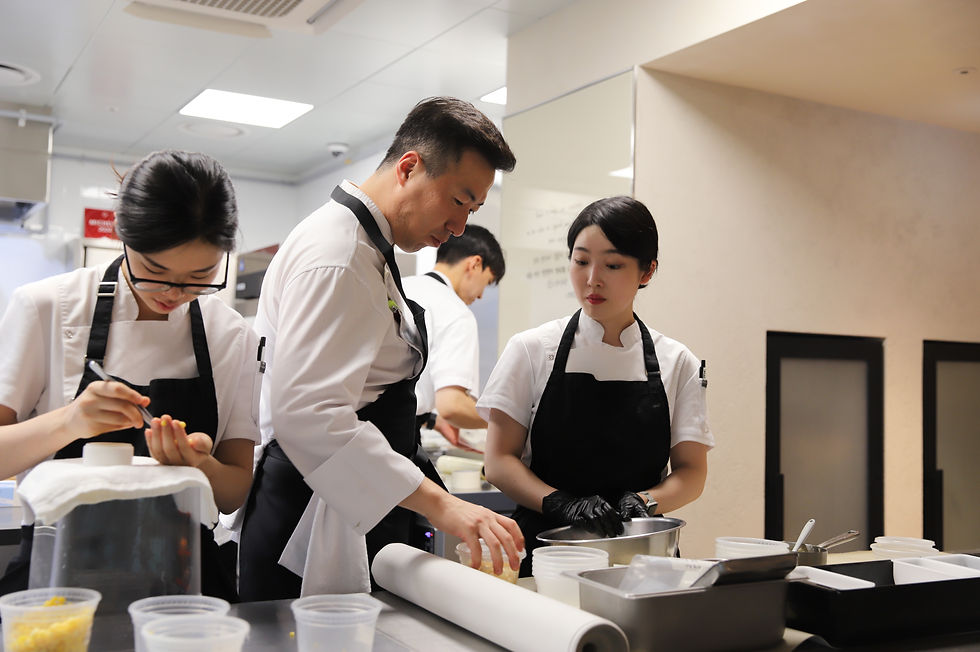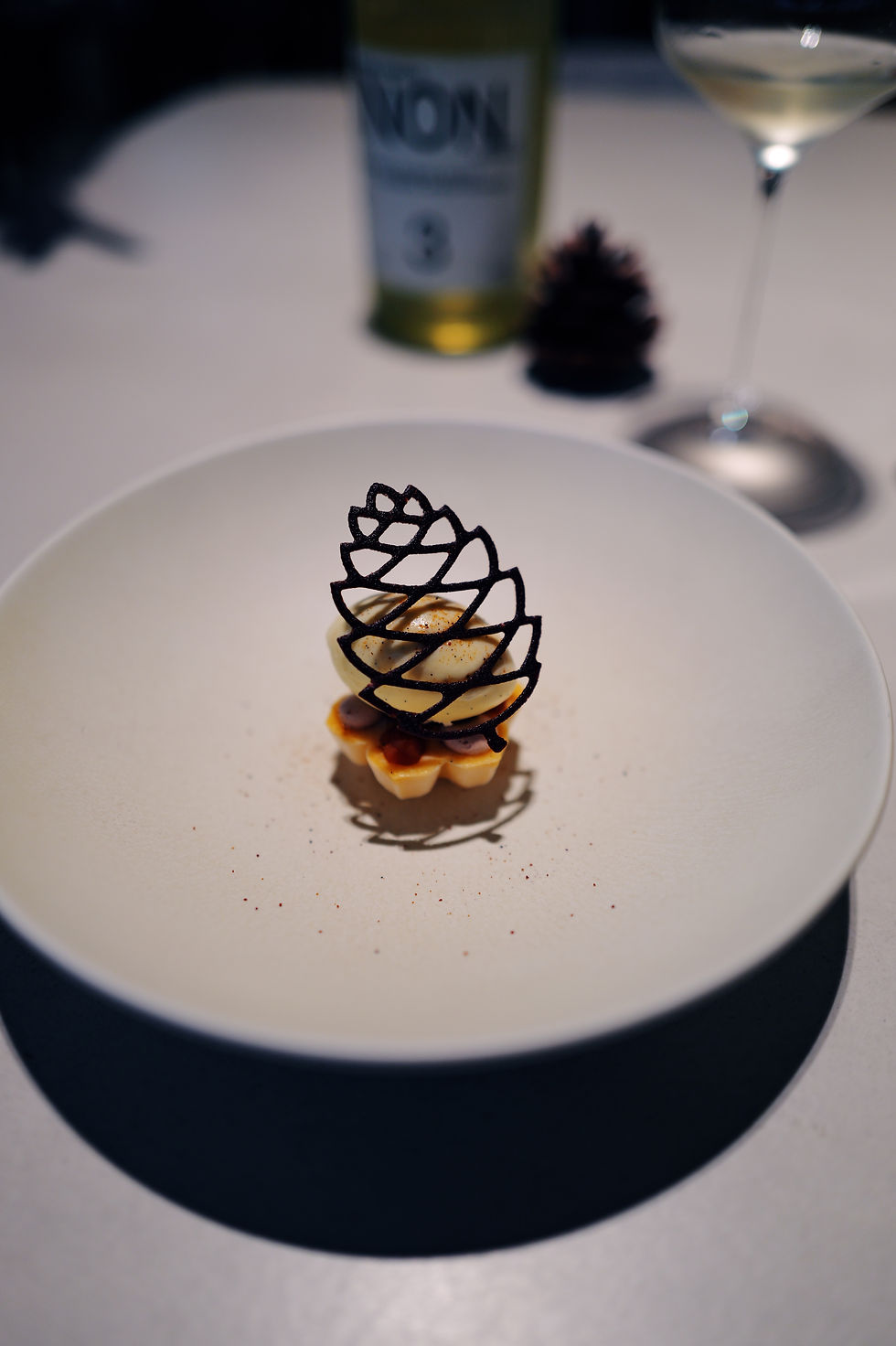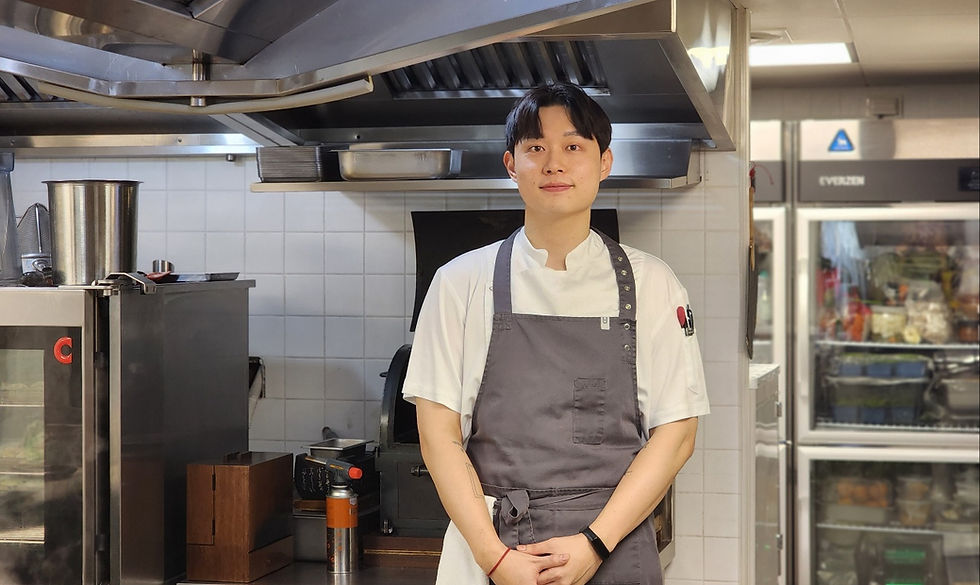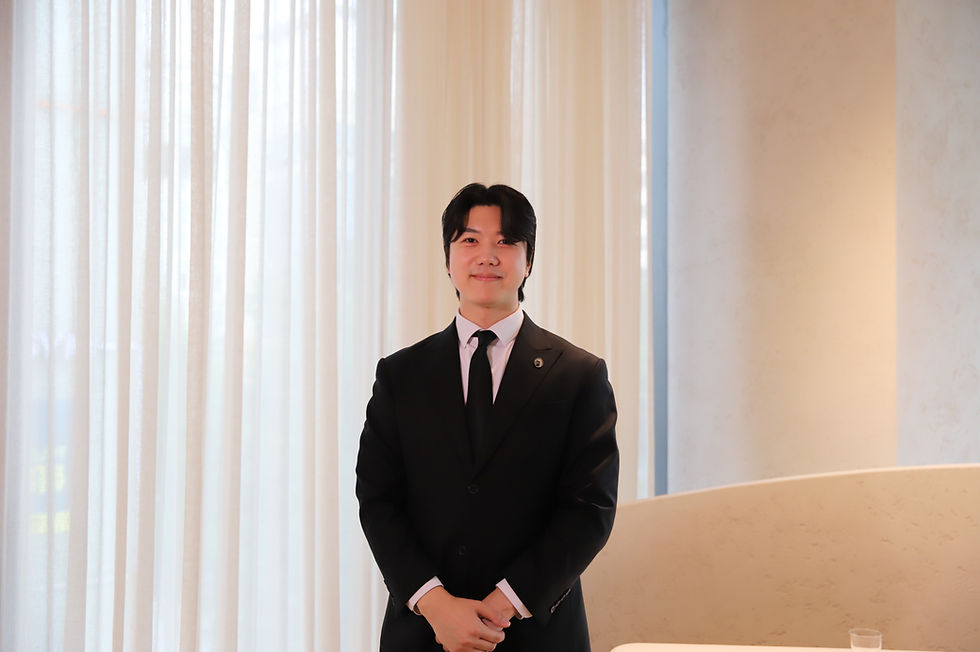Pastry Chef Sungeun Kim
- diningmediaasia8
- 7월 28일
- 6분 분량
The pastry chef who crafts the final lingering note in the graceful orchestra that is fine dining — this is the story of Solbam's pastry chef, Sungeun Kim.

How did you first start cooking?
I’ve always been interested in pastry since I was very young—so young, in fact, that I can barely remember when it started. But unlike many others, I wasn’t cooking from an early age. My parents were opposed to the idea of me pursuing a career in the culinary world, so during school breaks, I would only take classes casually, more as a hobby than anything else. After graduating from an international school in Jeju and preparing for college, I told my parents I wanted to major in culinary arts—and they strongly opposed it.
But I knew I wanted to live a life doing what I truly loved. I didn’t want them to think I was just trying to escape academics, so I applied to and was accepted by both an art school and a business school, just to prove that I wasn’t running away from studying. It was only then that my parents changed their minds. That’s how I ended up enrolling at the Culinary Institute of America (CIA) in the United States.

You’ve been with Solbam since its opening and have grown with the team ever since.
After graduating from CIA, I was fortunate to cross paths with Chef Eom Tae-jun. It was during the pandemic, and returning to Korea made more sense at the time. A friend told me that Chef Eom, who was also a CIA alumnus, ran a disciplined kitchen and was someone I could learn a lot from. I applied for a position, and that’s how I joined Solbam in its opening year.
In the beginning, my goal was simply to do the job I was given as well as I could. I was the youngest in the kitchen and constantly on edge, so I made a lot of mistakes—but I focused on working hard. As the team evolved, I adapted and grew alongside it. Solbam, being my first workplace, taught me about teamwork, and my perspective has broadened so much since then. Over the years, team members have come and gone, but the core group that defines Solbam’s culture and style has remained remarkably consistent.
At first, I had a narrow mindset, thinking it was enough to just do my part well. But after being promoted to sous chef of the pastry team, I came to understand how challenging and important it is to lead a team and create success together. I also began to appreciate the struggles my seniors had gone through.
As Solbam grew, we began participating in brand collaborations and working with internationally renowned restaurants. When I visited Naro in New York, I was struck by how they planned their events one to two years in advance with meticulous preparation. It made me reflect on the importance of planning, and also inspired me to think more about how to express aesthetics and identity through our dishes and our restaurant.

Is there a particular collaboration that stands out?
One that I remember vividly was with Cristal Room by Anne-Sophie Pic in Hong Kong. Their featured dessert was a mille-feuille, and watching their pastry chef prepare each piece so delicately—like a work of art—left a deep impression on me. The dessert involved fragile elements like meringue and tuiles, which they transported by hand. I was told the chef held the ingredients close on the flight like a baby. That kind of passion was unforgettable. Watching them hand-shape each tuile with such care really showed their craftsmanship. They also used ingredients that we rarely encounter in Korea, like geranium, genmaicha, and sobacha, which gave me new ideas and inspiration.

How would you describe Solbam’s dessert style?
We aim to create desserts that subtly incorporate Korean influences—modern interpretations of traditional elements. For example, I once made a dessert inspired by “sudan,” a traditional Korean summer drink served cold with rice cakes in honeyed water. I hadn’t even known about it until I read about it in a book on Korean cuisine, but I found it fascinating because it has similarities to trendy drinks like bubble tea or fruit punch.
Another example would be reinterpreting yakgwa, a traditional Korean confection, as a sable cookie made with sesame oil instead of butter. My goal is to naturally blend traditional and contemporary elements into Solbam’s desserts in a way that feels seamless and sincere.

What is your process for developing desserts?
Sometimes Chef Eom gives us ingredient ideas, but more often, we conduct surveys and propose our own ideas. We have regular meetings to discuss menu development and craft desserts that reflect Solbam’s identity. Rather than creating a dessert from scratch all at once, I prefer to develop individual components—sauces, foams, ice creams—with high precision. Once the elements are perfected, I bring them together into a complete dessert.
I also want to showcase more Korean ingredients. Take peaches, for example—their taste and aroma vary depending on the region and the harvest period. I pay close attention to those nuances to create desserts that truly capture the season and landscape of Korea.
Why did you choose to work in a restaurant rather than a pastry boutique?
I absolutely love watching live performances—so much so that I go to musicals almost every week. What moves me is seeing different people fulfill their roles on stage to create a complete scene. I think fine dining is exactly the same. There's a catharsis that comes from multiple experts working together to create a single, integrated experience for someone’s special moment.
In a pastry shop, guests choose from a fixed menu. But in a restaurant, everything is more dynamic. It’s a complex collaboration that requires interaction and synchronization. When everything flows as planned, the harmony between different parts of the team is incredibly motivating and fulfilling for me.


How would you describe the culture of the team at Solbam?
Solbam has a great relationship between the kitchen and front-of-house teams. As an opening member, I’ve seen how far we’ve come—even though we weren’t perfect at the start, everyone approached the work with positivity and supported each other. That made the hard times feel much less difficult.
Communication has improved so much, too. Now, with just a glance or a subtle signal between the kitchen and floor staff, we instinctively know when to send out a dish. That’s the level of teamwork we’ve built.
Now in my fourth year, I’m focused on creating the kind of desserts I want to share with our guests. As head of a section, I feel the weight of responsibility not only for the dishes but also for the communication and collaboration within the team.
Do you have any role models?
Internationally, I really look up to Chef Eunji Lee of Lysée in New York. When I met her in person, she radiated such energy, and her knowledge and career are truly inspirational. In Korea, I admire Chef Kim Yosol of Elabore. Right before I became a sous chef, I often visited her restaurant with my team to try her desserts. She always welcomed us so warmly, and I still remember her saying, “Thank you for coming—it means a lot that younger chefs enjoy what I do.” That kindness left a lasting impression on me. She’s also from Jeju, like me, so that connection made it even more meaningful. I think of desserts as a sweet way of sharing love and emotion—and I want to be someone who communicates warmly through my work as well.

What are your future goals?
I want to find a natural balance between my personal style and Solbam’s style. When we first opened, there were 10 of us—now we’re 25. As Chef Eom often says, it becomes harder to maintain unity as a team grows. Everyone has different ideas of what ideal food or plating looks like. So I believe the most important thing is to understand the vision of Chef Eom, and then add my own ideas and personality to support and evolve that vision through teamwork.
Looking ahead to 2026, my biggest goal is to continue creating great desserts. It’s not easy to make something that appeals to everyone, but I’m pursuing that direction, and I hope the passion we pour into our work is recognized not only by our guests but also by critics. Our pastry team hasn’t hosted any interns yet either, and since I personally grew a lot through my own internship, I hope to work with students one day.
My life motto is to “enjoy the present.” Chef Eom often reminds us: “For the team, service may feel repetitive, but for each guest, this might be their one and only visit.” That’s why I strive to give my best every day and avoid falling into routine. I want to make the most of this time with no regrets—choosing to do things wholeheartedly rather than skipping out and regretting it later. Each day, I aim to fill my time with intention and meaning.



Comments